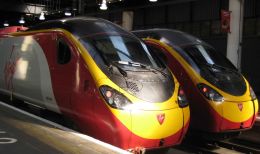Posted 16th February 2009 | 6 Comments
London-Glasgow journey cut to just over 4 hours

The fast Pendolino to Glasgow will be followed by another to Preston.
THE fastest train journey between London and Glasgow will be cut to just 4 hours 10 minutes from today.
Two months after the £9 billion West Coast Route Modernisation project was completed, the final stage of the ‘Virgin High Frequency’ (VHF) timetable is implemented from 16 February.
This includes the introduction of a new fast service, leaving London Euston at 16.30, calling only at Preston, due to arrive in Glasgow Central at 20.40.
Last December, Virgin Trains increased the number of weekday services — using tilting Pendolinos with a top speed of 125 mph (200 km/h) — in each direction between London Euston and Glasgow from nine to 13 with typical schedules for the 401 miles then reduced by around half an hour to 4 hours 32 minutes.
The new service shaves a further 22 minutes off Virgin’s previous best journey time and is aimed at business travellers returning to Lancashire and Scotland. With its first stop at Preston, the train is due to run the 209 miles from London in exactly two hours at an average speed of 104.5 mph.
Intermediate stops previously made by the 16:30 from London - Glasgow will be transferred to a new train at 16:33 to Preston.
• The fastest-ever London-Glasgow journey was made in December 1984, when a prototype Advanced Passenger Train (APT) completed the journey in 3hours 52 minutes, including one stop.
London - Chester service boosted
VIRGIN Trains also boosts the London – Chester service from 16 February, with 13 direct trains to and from London on Monday to Fridays and a typical journey time of 2 hours 5 minutes. Regular direct trains will run at weekends, too, with typical journey times of 2 hours 15 minutes.
There is good news for business travellers who will be able to catch early direct trains, arriving in London at 08:36 or in Chester from London at 09:12.
Virgin Trains Chief Executive Tony Collins said: “The new weekday Chester timetable is the final element in massive improvements to our services following the £9 billion upgrade of the West Coast Main Line by Network Rail. More seats and reduced journey times are huge wins for passengers. We are looking forward to providing a great service to a great city.”
Reader Comments:
Views expressed in submitted comments are that of the author, and not necessarily shared by Railnews.

David, Braunschweig (Brunswick), Germany
Hold tight, you snipers: I was on the APT when it ran from Glasgow to London in just under four hours also in 1984; it was a political decision, not a railway decision, to discontinue investing in the tilt technology (thank YOU Madam Thatcher). I'd be interested to know what the balance would have been, had BR been supported by the government, as it should have been. There have been sales worth billions of tilt-technology trains over the last couple of decades, in which I say BR should have had a cut.
Jules, Lowestoft
This further emphasises that the supposed downturn in rail usage due to the credit crunch may be (to some extent) compensated by new services. It is true that the new services may suffer a reduction of actual usage compared with actual passenger numbers - but they are still new. If it weren't for the South East commuter services I would guess that overall rail usage would continue to grow. Companies should stick to their guns and introduce new services (as they intended to) even if actual usage may be 3%, 5% or 10% down compared with projections, it's still an improvement, still more people using rail. Just less than projected for the new services, but still new people, new journeys. Instead of (say) 1,000,000 new journeys generated on a line , perhaps still 800,000 - that's still impressive... That's still 800,000 more journeys...
David Spencer, Bolton,Lanashire, UK
I agree with the last letter from Leslie Burt above. 4 hours 10 mins is an improvement but stil oh so slow. That high speed line is what we all want and trains that can match Japans Shinkansen. UK is always behind the times.
Anoop, Harrow
The APT smashed the record without the benefit of a £9 billion upgrade, although traffic was lighter at that time and it could exceed the speed limits for conventional trains. The APT programme was cutting edge, but it was still at the prototype and development stage and not reliable enough for full implementation. If BR and the Government had had faith in it and had continued funding its refinement it may well have been a success.
Jonathan, Stockport
I agree. 4hours 10 is good, but still doesn't rival getting a plane (despite all the check-in faff). Funny though how the APT in 1984 managed it in 3hours 52 and 25 years later virgin are popping open the champagne for 4hours 10... am I missing something here? Fair enough, the APT had a max speed of 155mph and kept breaking down but 25 years on is a long time.
leslie burge, leicester, england
Very good but now get a high speed line built and do it in under 2-!/2 hours.